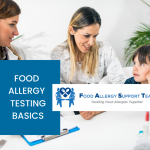Making OIT a More “Positive” Experience
Food allergy has many effects on patients and families including the difficulty of avoiding the food or foods you are allergic to and the fear of rare, but unpredictable anaphylaxis. Currently, the only FDA-approved and increasingly used treatment for food allergy is oral immunotherapy (OIT), ingesting initially tiny amounts of the food and slowly increasing the dose to develop a state of desensitization where you can now tolerate a certain dose without symptoms. Research has shown for peanut allergy, when at a top or maintenance OIT dose of at least 300 mg (approximately equivalent to one peanut), that person is 97-99% protected from usual accidental exposures while continuing to avoid the food. Some health care providers and patients increase the maintenance dose higher to be able to freely eat peanuts or whatever their allergic food may be.
But there are potential side effects associated with OIT during the buildup and maintenance phase, even rarely including anaphylaxis, and these can be uncomfortable and scary for many patients and families. Recent research has shown that the way health care providers discuss the side effects of OIT can greatly affect the patient and family experience.
A peanut OIT study conducted at Stanford divided the children into two groups. When discussing the potential OIT-related side effects, they educated both groups the same about the rare instances where an epinephrine autoinjector should be used. But when discussing the more common, non-life-threatening side effects such as itchy mouth, nasal congestion, and abdominal discomfort, they took two different approaches. To one group they explained that these unpleasant side effects are something everyone who does OIT has to go through, but eventually they go away. To the other group they explained that although these symptoms may be unpleasant, they are a positive sign that you are becoming desensitized to the increasing peanut doses and a sign the treatment is working. Similar to sore legs after vigorous exercise as a sign your muscles are getting stronger. And eventually the symptoms will go away.
What did they find? Both groups achieved the top dose of the peanut OIT, but the children and families that received the positive message that symptoms signal desensitization, were less anxious, experienced fewer non-life-threatening symptoms as the doses were increased and were less likely to miss or skip doses. And that group even had a higher blood marker for a positive immune system response.
Discuss this with your allergist and make OIT a more positive experience!
*****************
Alan Goldsobel, MD
Allergy and Asthma Associates of Northern California
http://www.allergycare.com





